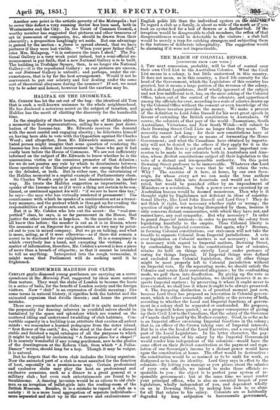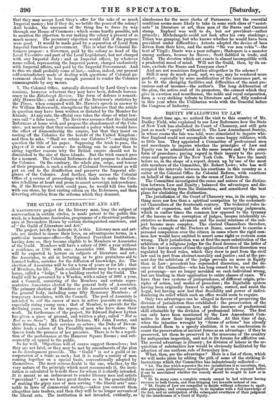THE MARCH OF COLONIAL REFORM.
[CONTINUED PROM LAST woes.) 5. THE next concession, probably, will be that of control over their own Civil List to the Australian Colonies. What the Civil List means in a colony, is but little understood in this eountry. It does not mean, as in this country, a fixed life-annuity for the head of the Government, which the Legislature of this country has granted, but it means a large portion of the revenue of the colony, which a distant Legislature, itself wholly ignorant of the subject and not less indifferent to it, has, on the mere asking of the Colonial Office, taken out of the control of the colonists, and apportioned. among the officials for ever, according to a scale of salaries drawn up by the Colonial Office without the consent or even knowledge of the people whose taxation provides the money. We make a present of the definition to Lord John Russell for his next great speech in favour of extending the British constitution to Australasia. Of course, the colonists of that part of the world—Tasmanians, South Australians, Victorians, and New South Welsh—will submit to their Downing Street Civil Lists no longer than they must. The necessity cannot last long : for their new constitutions have at least the merit of efficiency as means of tormenting the Home Government; and what the Canadians have obtained by importu- nity will not be denied to the others if they apply for it in the same way. But there is yet another and a more important con- cession to be made to our colonists both in Australasia and Ame- rica, whose British constitutions subject all their legislation to the veto of a distant and irresponsible authority. On this point Downing Street professes to be immoveable. Whatevez else,lord Grey may " abandon," he vows that he will retain the veto.- Why ? The exercise of it here, at home, by our own Sove- reign, for whose every act we can make the true authors responsible, has fallen into desuetude and would not lie tole- rated, but would be punished either by an impeachment of Ministers or a revolution. Such a power over us exercised by an Australian bureau would be deemed monstrous. Then why is it thought right by Englishmen not deficient in ideas of constitu- tional liberty, like Lord John Russell and Lord Grey ? They do not think it right, but necessary whether right or wrong ; the question of right or wrong being disregarded by them, because it only concerns distant communities, with which they have not, and eannothave, any real sympathy. But why necessary ? In order to guard Imperial interests—in order to prevent the colony from legislating hurtfully to the empire. Thus COlonial liberty is sacrificed to the Imperial connexion. But again, why ? Because, in forming Colonial constitutions, our statesmen will not take the trouble to separate Colonial from Imperial jurisdictions. A veto over legislation on Colonial matters is not necessary ; but as it is necessary with regard to Imperial matters, Downing Street, by confounding the two in the constitutional law of colonies, retains its hold on things strictly Local under pretence of caring for things Imperial. If Imperial things were defined and excluded from Coloaial legislation, then all other things might be most properly left to Colonial jurisdiction without an Imperial veto. By the separating mode, we should satisfy the Colonies and retain their contented allegiance ; by the confounding mode, we gall them into disaffection. By giving up the veto as respects matters of Local legislation, we should preserve it as re- spects Imperial matters ; by preserving it where it ought never to have existed, we shall lose it where it ought to be always preserved. 6. The foregoing distinction is of practical moment just now, because Lord Grey has proposed an innovation in Colonial govern- ment, which is either reasonable and politic or the reverse of both, according to whether the Local and Imperial functions of govern- ment in a colony shall be separated or confounded. He proposes, (in the despatch before quoted,) as a proper consequence of giving up their Civil List to the Canadians, that the salary of the Governor of Canada shall be paid by the Mother-country. Good, in so far as he is an Imperial officer exercising Imperial functions in the colony ; that is, an officer of the Crown taking care of Imperial interests. But he is also the head of the Local Executive, and a coequal third part of the Local Legislature. In his latter character, the pay- ment and regulation of his salary by the Imperial Government would render him independent of the colonists—would have the same effect on their British constitution as the payment and regu- lation of our Sovereign's income by a distant power would have upon the constitution at home. The effect would be destructive : the constitution would be so maimed as to be unfit for work, so disfigured as to lose its identity. Lord Grey says in effect to the colonists—By lettingyou manage as you please about the salaries of your own officials, we intend to make those officials re- sponsible to you : the object is to perfect your system of re- sponsible government:. but at the same time we must render your principal officer, who is also an essential branch of your legislature, wholly independent of you, and dependent wholly on us in Downing. Street, by making him look to us alone for all that relates to his salary. Colonists are so habitually degraded by long subjection to bureaucratic government,
that they may accept Lord Grey's offer for the sake of so much Imperial money ; but if they do, wo betide the peace of the colony! And besides, the unreason of the thing has to force its way through our House of Commons ; which seems hardly possible, not to mention the objection to our making the colony a present of so much money. The pecuniary objection would fail if the purpose were good. It would be made good by a separation of Local from Imperial functions of government. This is what the Colonial Re- formers propose : a Governor, paid by the colony as head of the Local Executive and part of the Local Legislature, but not charged with any Imperial duty ; and an Imperial officer, by whatever name called, representing the Imperial power, charged exclusively with Imperial affairs, and paid by the Imperial Government. And to this we shall probably come at last,—unless, indeed, our present self-contradictory mode of dealing with questions of Colonial go- vernment should be long enough pursued to render the Colonies unmanageable by any means.
'7. The Colonial Office, naturally distressed by Lord Grey's con- cessions, however reluctant they may have been, defends bureau- eracy in the Edinburgh Review. The form of defence is remark- ably Hawes-like ; and a dissection of the Reviewer's statistics by the Times, when compared with Mr. Ilawes's speech in answer to Sir William Molesworth, strengthens the inference that the article in question may have been written or dictated by the Member for Kinsale. At any rate, the official case takes the shape of what law- yers call " a false issue." The Reviewer assumes that the Colonial keformers at home wish and propose the abandonment of the Colo- nies ; not merely that they recommend a policy which would have the effect of dismembering the empire, but that they insist on casting off the Colonies for the benefit of the United Kingdom : and then he asks, "Shall we retain our Colonies? "—making this question the title of his paper. Supposing the trick to pass, the player of it wins of course : for nothing can be easier than to string together reasons why the British empire should not be diminished to the size of these islands. But the trick cannot pass for a moment. The Colonial Reformers do not propose to abandon the Colonies. On the contrary, the whole aim, scope, and tenour of their proposals, is such a reform of Colonial Government as will put an end to the disaffection and preserve the Imperial alle- giance of the Colonies. And further, they accuse the Colonial Office of a course of proceedings which tends to make the Colo- nies rebellious at heart and prone to assert sovereign independence. So, if the Reviewer's trick could pass, he would kill two birds with one stone, by first casting odium on the Reformers, and then diverting attention from the reforms which they demand.



























 Previous page
Previous page